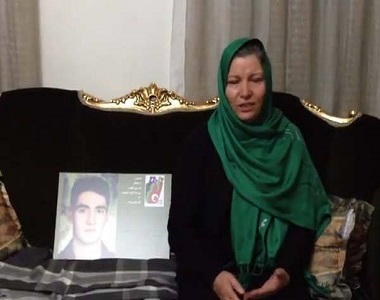 They described the plunder, looting, cruelty and tyranny of the workforce carried out by inhumane religious dictatorship over the past 36 years as 'unprecedented in contemporary history'.A statement by the Labor Commission of the National Council of Resistance of Iran said: "This regime and its leaders have used the work of laborers and Iranian people’s wealth for the purpose of suppression, for anti-nationalistic nuclear projects, and for spilling the blood of the deprived people of Iraq, Syria, Yemen and Lebanon, or have plundered this wealth in billions of dollars."
They described the plunder, looting, cruelty and tyranny of the workforce carried out by inhumane religious dictatorship over the past 36 years as 'unprecedented in contemporary history'.A statement by the Labor Commission of the National Council of Resistance of Iran said: "This regime and its leaders have used the work of laborers and Iranian people’s wealth for the purpose of suppression, for anti-nationalistic nuclear projects, and for spilling the blood of the deprived people of Iraq, Syria, Yemen and Lebanon, or have plundered this wealth in billions of dollars."
This had caused rampant unemployment of almost a third of the 64 million strong workforce, the Resistance said.
It added: "The closing down of the factories and production units continues and adds to the large number of unemployed."
The statement said Sahlabadi, head of Chamber of Industry, Mines and Trade, stated: "Only 40% of country’s industrial and production units are working. 38 cotton cleaning factories closed down with the land used for production of cotton in Golestan Province dwindling by a large percentage. The land used to grow cotton in this province dropped from 180,000 hectares to 10,000 hectares."
It quoted the head of the Tea Farmers Union as saying: "Much of the land to grow tea has been abandoned and turned into jungle with the tea industry about to be destroyed."
And Hassan Hefdahtan, Rouhani’s Deputy Minister of Labor, stated in a shocking admission: "Between 1997 and 2011, the percentage of cost of the wages in the total cost of production has plummeted from 13% to 5%"
The statement continued: "In the mullahs’ regime, workers lack the least legal protection and employers who are mostly regime’s officials and revolutionary guards, have no restrictions in firing them from their jobs or aggression against their rights.
"According to the Ministry of Labor statistics, only 7% of the workers are employed with ‘official contracts’ and 93% are working based on temporary contracts.” The great majority of Iranian workers are working in workshops with less than 10 laborers and thus they are not covered by the Labor Laws.
"Moreover, safety rules for workers are not observed. In 2013 alone, more than three thousand workers lost their lives to accidents. Every week nearly 40 workers die in work related accidents. One million construction workers do not have social security insurances. Most of them work in the IRGC construction and dam building companies and most of the work related injuries are related to these workers.
"In such circumstances, according to government reports, some young people, including girls, want to sell their kidneys… due to unemployment or debt. In 2010, 1690 kidney transplants were performed from cases who volunteered to sell their kidneys. The price of a kidney in unofficial market reaches even 10 million toman.
"In Tehran's Darvazeh-Ghar District, children are traded anywhere from 100,000 toman to five million tomans.
"Three million children are deprived of schooling due to poverty. The state media have reported that the gap between social strata in Iran has increased 30 fold and Iran has the largest class differences in the world.
"The situation is so dire that the American and Arab media write about the huge wealth of a small minority in Iran with great awe. The $500 billion in oil revenues over five years has had an important role in the development of this phenomenon.
"According to regime's own media, there are people who are living in legendary palaces and houses. This legendary wealth and this unprecedented poverty is caused by the theft, corruption and bribery in the mullahs' regime in which all regime's leaders are involved. Khamenei, the chief crook, is the criminal leader of this regime who controls the Executive Committee of Imam's Order worth $95 billion.
"The assets of this financial empire are obtained through the confiscation of properties of millions of Iranian citizens, including families of PMOI and their supporters, as well as other dissidents and religious minorities.
"In addition, a large section of the vital arteries of country’s economy is in the hands of the Iranian Revolutionary Guards and such foundations as the Foundation of the Oppressed that is under Khamenei’s direct control and exempt of taxes, like all other property affiliated with him."
It added: "In 2014, through thousands of strikes and protests you showed that you have arisen to end the suffering of the large majority of the Iranian people. All this pain and suffering is caused by the anti-human regime of the mullahs that has employed all of Iran’s national wealth and all your toil in order to buttress its shameful rule and survive.
"As long as they are in power, our people and especially the workers and toilers become poorer every day and their pain and suffering grows. While with each passing day the regime's cart of exporting terrorism to Yemen, Syria and Iraq plunges deeper aground and its nuclear projects that were supposed to rescue this regime have become its noose, the regime is on its way to its demise.
"Thus, the time for the realization of the will of the Iranian people, i.e. the overthrow of this regime, and for the uprising of the workers, toilers and the youth to eradicate mullahs' oppression and tyranny and their astronomical plundering, and for establishment of freedom, democracy and social justice, has come."

